they first make the effort to do so.
(Al-Qur’an – 13:11)
Marcus Wetter, a German filmmaker, has made two films set in the city of Jenin, a stronghold of Palestinian resistance. His first, Heart of Jenin (2009), was directed together with his partner, Leon Geller. The film followed Palestinian Ismail Khateb, whose 12-year old son, Ahmed, had been shot dead by Israeli soldiers while playing with a plastic gun. But instead of vowing revenge against the killers, Ismail went on a personal crusade to foster peace and understanding between Palestinians and Israelis: first by donating his son’s organs to Israeli children, and then visiting the families of the children who received the organs to assure himself that his and his son’s legacy lived on. Ismail nurtured the hope for peace between Palestinians and Israelis in the future. In 2008, Marcus Vetter and Leon accompanied Khatib on his journey. The result was The Heart of Jenin, which won the Cinema for Peace Award in 2009 and the German Film Prize in 2010. The second film by Marcus, Cinema Jenin: Turning Dreams into Reality, was made in 2012. It would not have happened if not for Heart of Jenin.
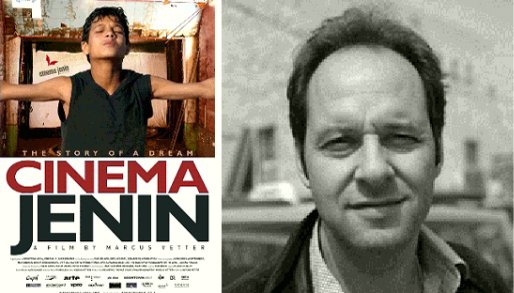 Marcus Vetter
Marcus Vetter
The cinema in Jenin, a Palestinian city on the West Bank, was vital to Palestinian cultural life. It ended with the intifada (Arabic: uprising) of 1987. In 2008, after discovering the dilapidated cinema, Marcus began the process of negotiating the renovation and eventual reopening of that cinema. Funding was provided by the Palestinian Ministry of Culture and the German government. Marcus was supported by local and German volunteers that also included Juliano Mer-Khamis, Israeli actor, director, political activist and director of the Freedom Theatre in Jenin. His secret love was the cinema, and he supported the rebuilding of Cinema Jenin from the very beginning. Just two days before Marcus was to discuss a cooperation between Cinema Jenin and the Freedom Theatre, Juliano was brutally shot to death near the Freedom Theatre in Jenin, which Juliano had founded in 2006. Together with Ismail Khateb, Vetter decided to undertake the ambitious (and at times, hazardous), cultural project, assisted by cinematographers Aleksei Bakri and Mareike Müller.
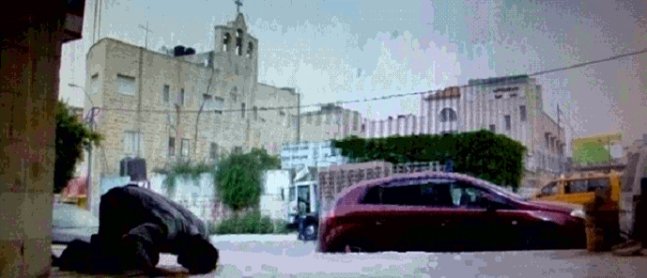 The presence of religion & its related issues is not to be taken lightly in Jenin.
The presence of religion & its related issues is not to be taken lightly in Jenin.
As a Muslim, Ismail has come to terms with his and his son’s fate. He holds on to his understanding of the sixth pillar of the Islamic faith: that all good and bad emanate from Allah, and that Man is but a ‘pawn’ in the greater scheme of things. He knows that the taking of as life (as enjoined in the Quran), is as if the whole life of mankind has been taken. Ismail knows that the killers of his son may escape punishment in this world but they will nevertheless be answerable for their deeds in the next. Ismail’s actions throughout the film reflect his philosophical outlook and his deep concern for Palestinian children that he, in a sense, has adopted as his own.
For both Marcus and Ismail, the journey in Heart of Jenin, has actually been one of discovering themselves. For Ismail, it was a journey to reaffirm his faith in mankind and his hope for peace. For Marcus, the tenacity and determination that he saw in Ismail became the driving force to further document the story of Ismail’s dream for Palestinian children. Whether Marcus realizes it or not, he has in fact taken it upon himself to bring about an understanding for others that the world will not change but men could. As a filmmaker, he knows that anything is possible if only we put our hearts, minds and will to it, and that the power of cinema can bring about changes.
In Cinema Jenin: The Story of a Dream, another journey is also taken. This time it is a journey for Marcus as much as it is for Ismail. It was a dream that they both fervently shared. Marcus now takes Ismail’s story to the next level, this time by reviving cinema in Jenin through a project called Project Cinema Jenin. The idea was that by introducing filmmaking in Jenin, it could keep children off the streets, and the screenings of the films would then become a celebration of the humanity of man (even if it be the stuff of dreams!). For Marcus and Ismail, it all begins with the idea of first rebuilding an abandoned cinema in Jenin. The city once had many cinemas but various intifadas had made life and cinemas impossible. The last cinema had closed in 1987 with a few others having been destroyed. Could Project Cinema Jenin proposers overcome the animosity and prejudices that existed among the Palestinians to cinema? Could solidarity and cooperation be achieved between them and the cinema owners, politicians, religious authorities and the common people in reviving cinema in Jenin?
In a tour de force of cinematic storytelling, Marcus keeps us riveted with the story of Project Cinema Jenin from the inception of the idea through to its final completion. It is a story that is structured like a narrative film with twists and turns, numerous obstacles and disappointments, recognitions and reversals, confronting various ideologies and political issues, coming up against unfounded rumours about the foreign volunteers, and even landing in court for ‘disturbing the peace’! A supportive theatre activist is shot dead by unknown killers and this puts the foreign volunteers lives in danger. Ismail himself at a point becomes disillusioned and withdraws from the project after an Israeli air strike kills many Palestinian children.
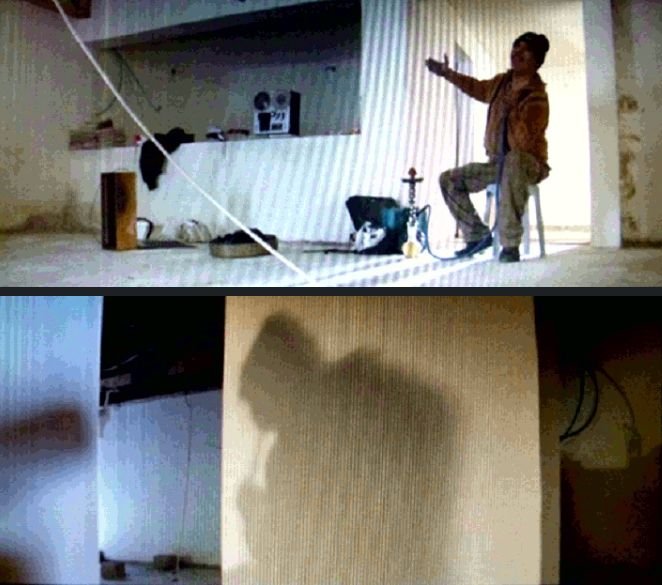 A worker takes a breather and is almost like an actor. His shadow takes us back to the origins of cinema.
A worker takes a breather and is almost like an actor. His shadow takes us back to the origins of cinema.
Throughout Cinema Jenin, Marcus uses the language of cinema to highlight, subtly, the presence of cinema in Jenin and also foreshadowing the ultimate success of Project Cinema Jenin. This can be seen in the use of light (a signifier of hope) coming from windows (as if it was the projector’s light). Another recurring motif is the use of white screens (with one even having the shadow of a man) or of windows washed out with light and looking like the cinema screen. An interesting take on the presence of cinema in the daily life of Jenin is the recording of a flamboyant policeman who directs traffic with the flair of a mime artist. And he even freezes (as in film) in mock surprise at a motorist, then unfreezes and continues with his directing with a smile. This scene is later echoed with Marcus himself on camera exhilaratingly directing work on the building of the cinema.
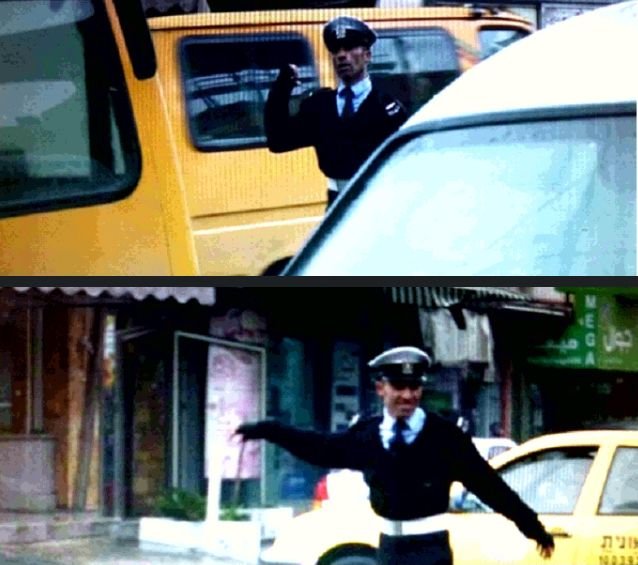 Cinema is all around us. A cop, like a mime artist, directs traffic, going through his motions effortlessly like an actor.
Cinema is all around us. A cop, like a mime artist, directs traffic, going through his motions effortlessly like an actor.
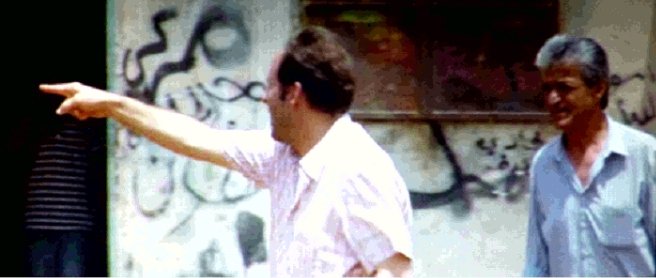 The filmmaker, at the centre of his story, echoes the actions of the cop directing traffic.
The filmmaker, at the centre of his story, echoes the actions of the cop directing traffic.
It has been said that cinema is spiritual. The deep narrative structure of Cinema of Jenin itself shows this running throughout the film. Spirituality (or the lack of it) can be seen in some of the various personalities depicted in the film. Through binary opposites, Marcus shows how the authorities (the Minister of Culture, President, Prime Minister of Palestine, the German government and even the Mufti), unreservedly support Project Cinema Jenin while those with vested interests (the cinema owners functioning as capitalists), throw numerous obstacles in its path.
 (Foto: DW.com)
Left: Yasser Arafat, the first President of Israel, smiles benignly on the Presidential Advisor who supports Project Cinema Jenin. Right: And the dream becomes a reality.
(Foto: DW.com)
Left: Yasser Arafat, the first President of Israel, smiles benignly on the Presidential Advisor who supports Project Cinema Jenin. Right: And the dream becomes a reality.
The cinema finally reopens on 5th August 2010 and appropriately, the first film to be screened is Heart of Jenin. Cinema Jenin is not just about reviving cinema in Jenin. It is about the story of a group of people who had a dream and who were determined to make it come true. Cinema Jenin is in fact about anyone who has a dream and who possesses the tenacity to see it through.
In a director’s statement, Marcus notes: “Rebuilding Cinema Jenin gives each of those who participate the possibility to write the next chapter in their lives.” It is a chapter that will constantly be written and rewritten for as long as there are people with dreams and wanting to achieve it and for as long as there are stories to be told. Cinema is about dreams and in cinematic reality, anything and everything is possible. Cinema Jenin, however, proves that dreams can turn into reality and that it can be truer than the fiction often depicted in cinema. Marcus can rest happy that he and Ismail can also be included in the group that calls others to do good as enjoined in the Qur’an. And every time cinema is celebrated in Jenin, it is also a celebration of their efforts in making the dream of Cinema Jenin to become a reality.
This article was written for the Freedom Film Festival to coincide with the screening of Cinema Jenin, which was attended by the director, Marcus Vetter.